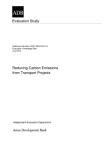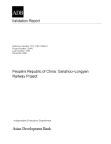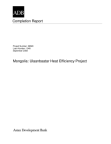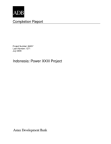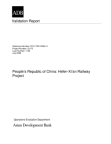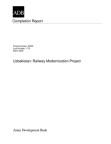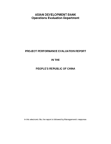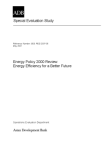This study is not a typical performance evaluation of past ADB projects. Instead, it evaluates the likely impact of ADB's transport portfolio on CO2 emissions.
ADB
China: Ganzhou - Longyan Railway Project
The Project was to provide efficient and low-cost transportation for passengers and goods, which would increase the development of natural resources and industry bringing more income to the local community and thus help reduce poverty.
Greenhouse Gas Implications of ADB's Energy Sector Operations
Globalization and technological advancements have created immense opportunities for wealth creation in all parts of the world.
Mongolia - Ulaanbaatar Heat Efficiency Project
The Ulaanbaatar Heat Efficiency Project was developed to address numerous deficiencies and shortcomings in the heat supply as identified in the late 1990s.
Indonesia - Power XXIII Project
The Project covered the construction of the 19 megawatt (MW) Tanggari II hydropower scheme (HPS) in North Sulawesi; the construction of the 210 MW Musi HPS in the southern part of Sumatra; reinforcement of transmission networks in the southern part of Sumatra; installation of waste heat recovery
China - Hefei-Xi'an Railway Project
The Hefei-Xi'an Railway Project (the Project) was conceived as a key intervention to promote pro-poor growth and create the employment and income-generating activities needed to reduce poverty.
Uzbekistan - Railway Modernization Project
Prior to Uzbekistan's independence, the country's railway system was the largest part of the former Soviet Union's (FSU's) Central Asian railways.
China - Evaluation of the Guizhou Shuibai Railway Project
In August 1998, ADB approved a loan for construction of the Guizhou Shuibai Railway Project. The loan was to finance a 121 kilometer (km) standard-gauge, single-track, electrified railway line from Liupanshui to Baiguo in the western part of Guizhou.
Energy Policy 2000 Review: Energy Efficiency for a Better Future
This evaluation was based on the analysis of ADB's operational data, ADB publications, and related literature, evaluation evidence in reports and databases, and country studies covering India, the People's Republic of China and Sri Lanka.
Energy Conservation Project in Mongolia (2005)
Adequate heating is essential for survival during the harsh winter in Ulaanbaatar, the coldest capital in the world (average annual temperature of 3 degrees Celsius below zero). Ulaanbaatar's district heating system was established in 1959.



